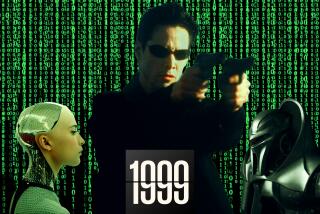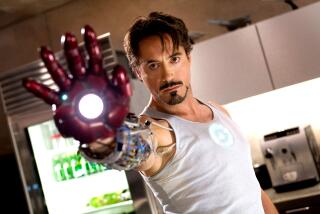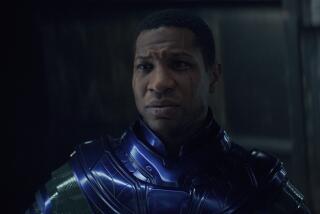‘Avengers: Endgame’ directors the Russo brothers on endings, Loki’s fate and the multiverse theory
“We think that characters are most compelling when they travel the greatest distance,” said Joe Russo, one half of the directing duo behind Marvel’s box office record-shattering blockbuster “Avengers: Endgame.”
[Warning for those who haven’t yet seen “Avengers: Endgame”: There are spoilers ahead.]
The movie, which is the fourth Marvel Cinematic Universe installment directed by Joe and his brother Anthony Russo, sees the original six Avengers grapple with distances of both time and space. Over the course of the three-hour film, our heroes travel across the galaxy to such planets as Vormir and Morag as well as to bygone battles from 2012 and 2014.
But most impressive are the emotional journeys the characters have undergone over the course of 22 films and 11 years: Tony Stark (Robert Downey Jr.) has evolved from a self-serving billionaire playboy to a father and husband willing to sacrifice his life for the good of the universe. Thor (Chris Hemsworth), introduced as a self-assured demigod, is forced to grapple with failure for the first time. And Natasha Romanoff (Scarlett Johansson), a self-interested Russian spy, has found her version of family as a member of the team and is willing to jump on the proverbial grenade to save it.
The film’s scope is nearly as large as its box-office haul, which stands at $1.6 billion globally after only one week of release. We caught up with the Russo brothers to discuss the ending of this chapter in Marvel and cinematic history, revisiting 11 years’ worth of mythology and the thorny theories of time travel.
ENDINGS
This is a moment where we’ve lost control of the movie and we’ve turned it over to audiences, and there’s a sense of relief in that for sure.
— “Avengers: Endgame” co-director Anthony Russo on releasing the movie
How does it feel now that this chapter of Marvel’s history is over?
Anthony Russo: It’s a really complicated mix of emotions for us. This is among our favorite work we’ve ever done as filmmakers, so to get to the end of it, there’s a sadness to walk away. But at the same time, we really firmly believe that all good stories have to have stakes and endings. So for us to have the opportunity to tell the final chapter in that [22-movie long] story was an amazing opportunity and a privilege. Also, it was a tough story to tell. I think for Joe and I, this is a moment where we’ve lost control of the movie and we’ve turned it over to audiences, and there’s a sense of relief in that for sure.
What was it like shooting Robert Downey Jr.’s last scenes as Iron Man?
AR: Joe and I always say Robert is the hardest-working actor we’ve ever encountered. He is very dedicated to his craft and puts an enormous amount of his psychic energy into his performance. As you can imagine, this character is as much of an iconic experience for him as it is for anybody in the [audience]. That shot where he says “I am Iron Man” and snaps his fingers was the very last shot of the entire movie. We shot that back in January [during the final reshoots] and we all walked away from the movie after he performed that moment. Oddly enough, we shot it in Raleigh Studios in L.A. where 12 years earlier on an adjacent stage, he’d done his screen test for “Iron Man.” So it was really a sense of completion and [coming] full circle.
It was widely reported that Downey and Chris Evans would be leaving the franchise after “Endgame,” but how long in advance had the endings for Captain America and Iron Man been planned?
Joe Russo: About three years. The first thing we did when we sat down to figure out the story we were going to tell was decide on the end of the movie. We had to know where “Endgame” was going in order to tell the best story possible. It’s how you maximize the drama and character architecture.
Why was it important to have a grown-up Harley Keener, the kid from “Iron Man 3,” at Tony’s funeral?
JR: We were thinking about who was important in Tony’s life, just on a very grounded level. And that was a character who’d shared a special moment in time with Tony. It felt organic for him to be there.
The funeral has quite a guest list. Were all of those actors actually in the same place for the scene?
JR: They were all actually there and that was perhaps the most [difficult] shot in all four movies that we’ve done for Marvel. We spent the entire day before we got them all out there with doubles [practicing] executing that shot.
What’s been your reaction to the record-breaking box office over this past week?
AR: For us, the box office is really just reflective of the audience’s appreciation. We put a lot of pressure on ourselves because we love these characters and these stories. We grew up on the mythology, collecting comic books. And these were the movies that we wanted to see, and now we’ve gotten to make them. As kids, we walked out of “Star Wars: The Empire Strikes Back” or “Indiana Jones” having had really profound spectacle, pop culture, cinematic experiences. We really wanted and were committed to giving that experience to audiences around the world with this movie.
TIME TRAVEL
FULL COVERAGE: ‘Avengers: Endgame’ »
OK, be honest: Do you guys understand everything about how time travel works as explained in the movie or are there still loopholes even for you?
AR: In the movie, the Hulk is very explicit about what our rules are, which is you cannot change the present by altering the past. All you can do by going to the past — and for a character like Cap[tain America], living in the past — is create an alternate future. So this is a world in which alternate timelines exist.
Was it difficult presenting a theory of time travel that hadn’t previously been explored onscreen?
AR: “Back to the Future” is one of our favorite films, and the rules of that movie are ubiquitous; they have informed pop culture for 40 years. And we wanted to do something different. We didn’t realize how complicated it would be to create new rules and have people go with us, but we learned very early on in the test screenings that people are really committed to those “Back to the Future” rules — if you shoot yourself, you should die. We spoke with a few physicists, and there’s a lot of theories about how time travel could work. We chose the multiverse theory.
We learned very early on in the test screenings that people are really committed to those ‘Back to the Future’ rules — if you shoot yourself, you should die.
— “Avengers: Endgame” co-director Anthony Russo on audiences’ understanding of time travel
What were the filmmaking challenges in revisiting previous MCU films and timelines?
JR: Probably just re-creating the sequences in a way that was accurate. [Chris] Pratt dancing [on Vormir], that’s some footage from seven years ago [in “Guardians of the Galaxy”] and some footage from him now and we had to intercut it.
People change, their looks change, so we really had to re-create everyone’s look. When Downey is watching the Avengers in that final moment with Loki where he says, “I’ll have that drink now,” that’s all of our current actors being made up to look like they did in the first “Avengers.” It was fun for us to create a different perspective for the audience. [While] “Guardians” opens up with this really joyful sequence where Quill is dancing his way through an alien planet, the truth of it may have been that that was all in his mind and he’s really just another guy singing out of tune to his Walkman.
Should we assume that Spider-Man’s classmates were all dusted in “Infinity War,” which is why they haven’t aged?
AR: We don’t want to ruin anything from “Far From Home,” but certainly Ned was dusted. And whichever characters haven’t aged were also dusted. But I think you’ll discover that there are characters that are now in college.
Since Loki vanishes with the Tesseract, could he still be alive in the new timeline or would Cap returning the stones undo that?
AR: Loki could absolutely still be alive in an alternate timeline.
CHARACTER ARCS
Death shouldn’t always be perceived as a bad thing. When people die to save other people, it is a noble thing and hopeful and heroic.
— “Avengers: Endgame” co-director Joe Russo on criticism over Black Widow’s fate
There’s been some backlash about Black Widow dying before her story was ever fully explored. What was the thinking behind her death in “Endgame”?
AR: We [thought] very specifically about what was the most satisfying ending for all of the main Avengers. And for Black Widow, she started as a villain. Basically through the films she finds mercy from Hawkeye, who has an opportunity to kill her and doesn’t. And then she gets a second chance, performing as a hero and becoming part of the Avengers. And now that she’s found a family like that, she wants to do what she can to serve that. That was pretty much her arc.
And when she’s put in a life-or-death situation, it’s Black Widow versus Hawkeye. One of them has to die for the soul stone. And even though he’s feeling bad about what he’s become since his family was dusted, he still has the hope in his heart somewhere that he can see them again. And I think that complicates his motivation in that conflict, and she ends up prevailing — she wins. So even though she dies, there’s a nobility and a victory in her death, and we think there’s a hopefulness in that as well.
JR: Death shouldn’t always be perceived as a bad thing. When people die to save other people, it is a noble thing and hopeful and heroic and perhaps the best outcome for a character possible.
There are significant callbacks to “Thor: The Dark World” in Thor’s story, but the movie remains one of the most criticized MCU titles. Do you think the movie is underrated?
AR: Well, it’s hard to judge. This is a mosaic of storytelling. It’s an experiment in narrative that has spanned over 10 years and 11 franchises. I think it’s hard to judge anything until the ending has been told. It’s like reading a book and going “I didn’t care for that chapter” before you get to the end of the book. Sometimes when you get to the end, it gives you perspective on all the different chapters. So hopefully people can go back and see that movie in a different light now, based on its significance to Thor and his character.
What went into getting chubby Thor’s look just right?
AR: Again, everything we do is grounded in story and character. If you look at the journey that Thor’s had, he’s had perhaps the most tragic arc of any of the Avengers. It’s truly Shakespearean: His mother died, his father died, his whole planet was destroyed at the end of “Ragnarok.” “Infinity War” opens with Thanos killing his brother and Heimdall and half of his existing people. He goes on a quest to avenge them and kill Thanos and he fails. You couldn’t drive that character any lower. And so where do you go from that moment? What is the road forward from all that pain and suffering?
A lot of times the road forward can be through humor and comedy, and that’s the road we decided to take with him. He did what he needed to do in order to protect himself from the pain and to tolerate his existence. And he did preserve himself long enough to find a road back from that. I think it was really the only real way forward for that character, considering how difficult his road has been up to that moment.
Why was it important for the women of the MCU get a special moment during the final battle?
AR: Looking back on the entire road that the MCU has traveled, it just struck us how many amazing female characters have entered the [landscape]. I think it was really, for us, a moment of celebration and acknowledgment of the intensity and empowerment in that.
ALSO
After ‘Avengers: Endgame’: Everything we know about what’s next for the MCU
‘Avengers’: Every MCU movie ranked in order of significance to ‘Endgame’
‘Avengers: Endgame’: Who died and who survived? A guide

Marvel fans were out in full force for the opening night of “Avengers: Endgame.” Their advice? Go to the bathroom before the film starts.
follow me on twitter @sonaiyak
More to Read
Only good movies
Get the Indie Focus newsletter, Mark Olsen's weekly guide to the world of cinema.
You may occasionally receive promotional content from the Los Angeles Times.







